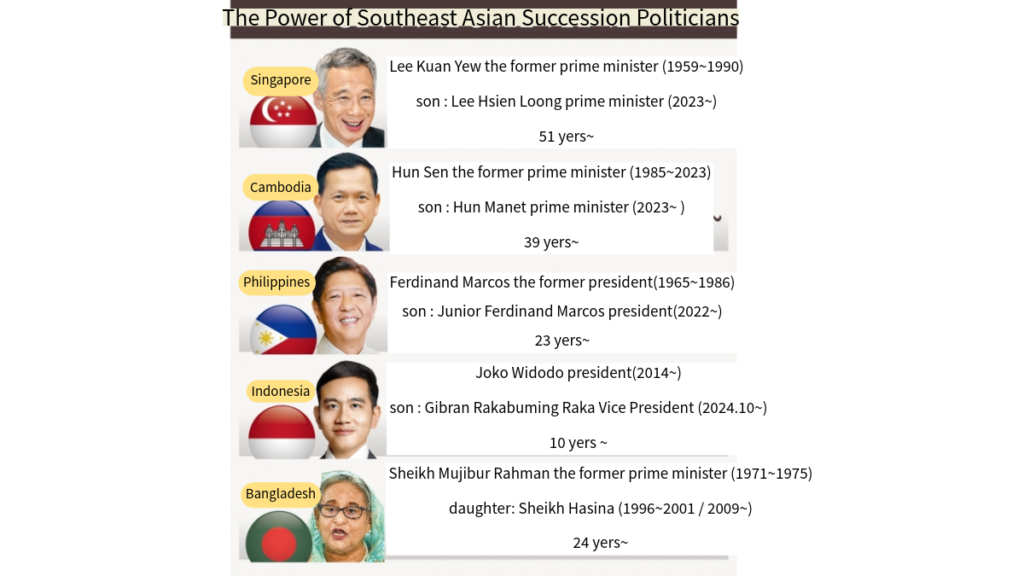
It is not unfamiliar that 2024 is the year of super elections. 76 countries, including Korea, which will hold general elections next month, will hold large or small elections this year. In some countries, however, the number of people in power does not change regardless of elections, and even elected officials are often passed down through veins. Southeast Asia is very unique in this regard. In addition to Indonesia (about 277.53 million) and Bangladesh (about 172.95 million), which are ranked fourth in the world population, and Cambodia, the Philippines, and Singapore have inherited the power of their son or daughter. In Thailand, the younger sister and brother-in-law of a prime minister were elected prime minister in the past, and now their daughter is a prime minister candidate. When the populations of these six countries are combined, more than 662 million Southeast Asian people are under “inheritance rule.”
In an era when even small pieces of news are spreading to the world via social media, why can such blood be passed down in a democracy? Furthermore, it is hard to say that the majority of these countries are oppressive to the hereditary family due to high popular support. James Crabtree, a columnist for Foreign Policy, a diplomatic magazine, said, “The heads of democracies in the West are often criticized by the public, but leaders in Southeast Asia are still popular even after they take power.” Through the keyword “inheritance,” this paper examines the unique political culture of Southeast Asian countries. Cambodia is the most dramatic example of hereditary politics. Former Prime Minister Hun Sen, 72, who stepped down last year after handing over the position of prime minister to his eldest son, has returned to the political front in less than a year. Hun Sen, chairman of the ruling Cambodian People’s Party (CPP), is expected to be the president of the Senate as the CPP won the upper house election on April 25 (local time). It has been six months since he handed over the position of prime minister to his eldest son, Hun Manet, in August last year. For 38 years, he has dominated Cambodian politics since becoming the world’s youngest prime minister at the age of 33 in 1985. For a long time, he founded the Hun dynasty by appointing not only his eldest son but also his entire family to key positions of power. The third son, Hun Mani, and his nephew-in-law, Net Saboeun, are deputy prime ministers and the second son, Hun Manit, is the highest ranking official in the Defense Ministry. Three years ago, Hun Sen openly said in public that he would become the prime minister’s father after 2023 and the prime minister’s grandfather in 2040. Indonesia is also a formidable rival. Defense Minister Prabowo Subianto (73) won the election on April 14, but analysts say that current President Joko Widodo (Jokowi) actually won the election. This is because his eldest son, Gibran (37), is his running mate. Prabowo and Jokowi are longtime political opponents who faced off each other twice in the 2014 and 2019 presidential elections. However, critics say that they regressed democracy by holding hands for power. Jokowi was a very popular president during his 10-year term in office. He was a self-made working class who achieved economic development and democratization at the same time. His approval rating reached the 70 percent level until recently. However, his reputation thus far faded by using various expedients such as election law revision to hand over power to his son.Bangladesh, Singapore and the Philippines are undergoing a more “smooth” hereditary succession compared to their two countries. Sheikh Hasina, 77, the daughter of the country’s 父 and prime minister in 2009, won his fifth consecutive term in the general election in January. The term “wealthy” refers to Sheikh Mujibur Rahman, who served as the first president and second prime minister. He was killed with his family in a coup in 1975, but his daughter Hasina, who was in West Germany at the time, returned to Korea in 1981 to succeed his father. In Singapore, where the prime minister is in power, Lee Hsien Loong, 72, the eldest son of the first prime minister Lee Kuan Yew, who died in 2015, has been in power since 2004. Last year, he promised to hand over power to Deputy Prime Minister Lawrence Wong before the 2025 general election, but local analysts say that the possibility of his third son, Lee Hong-yi, will inherit the power to his father, the 37-year-old son. In the case of the Philippines, President Ferdinand Marcos Jr. was elected in 2022 and became the “父” president after his father, Ferdinand Marcos, who ruled the country for 20 years. Also elected together, Vice President Sarah Duterte is the daughter of former President Rodrigo Duterte. In Thailand, the Thaksin Shinawatra family, who served as prime minister from 2001 to 2006, has a huge succession. His brother-in-law and sister were also prime ministers, and his daughter and current ruling party leader Patongtan Chinawat, 38, is also a strong candidate for the next prime minister.
JULIE KIM
US ASIA JOURNAL



